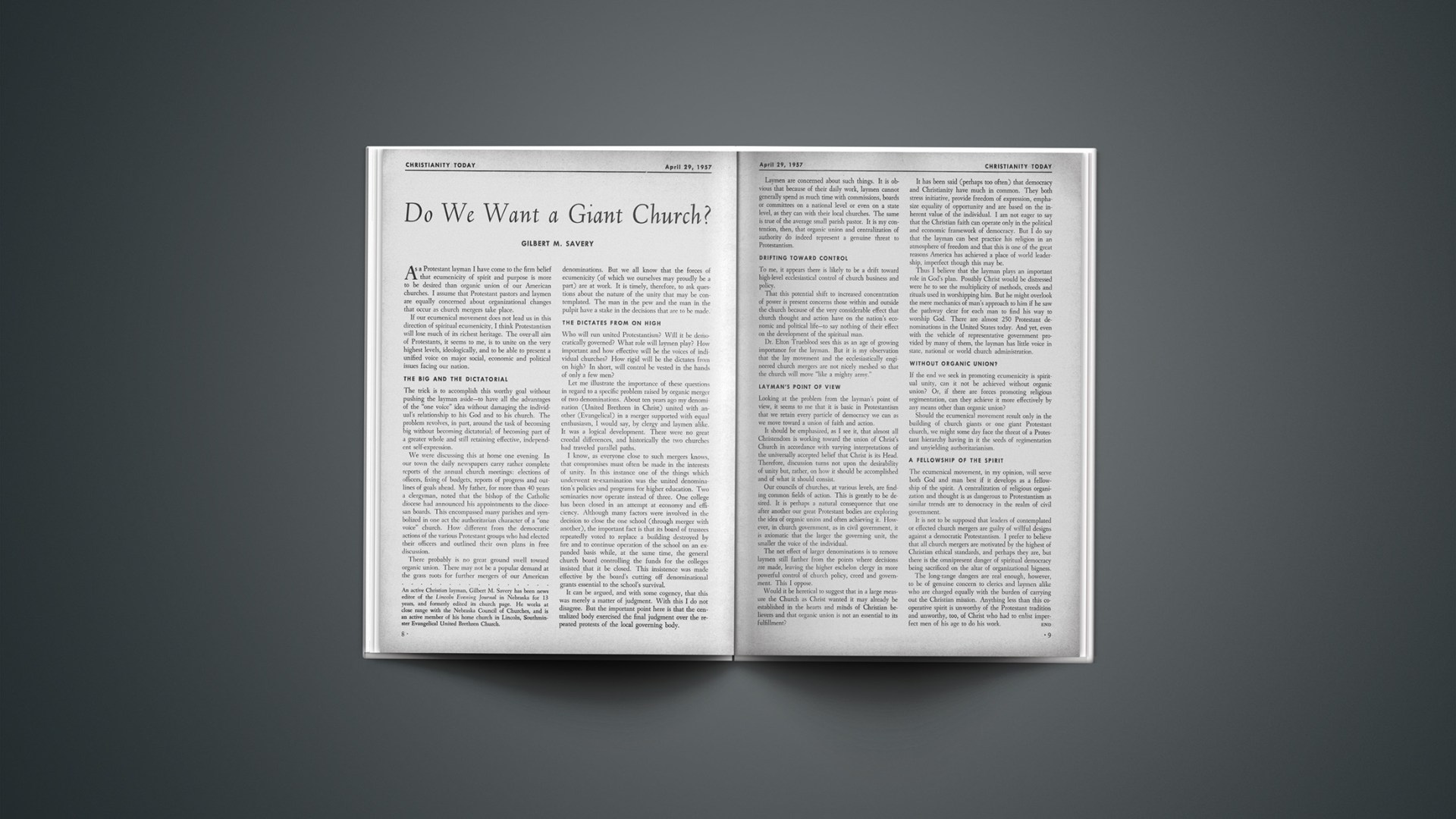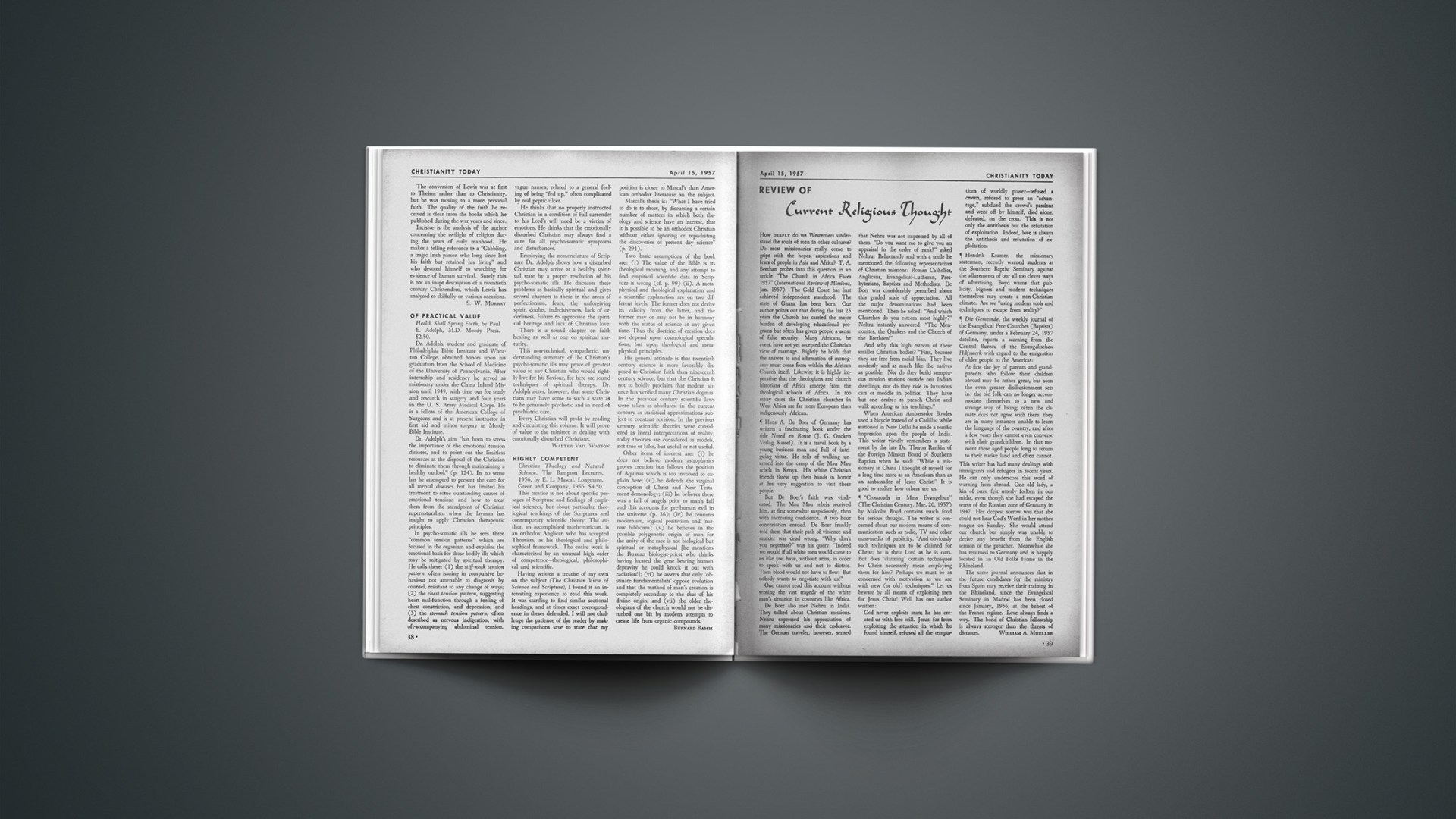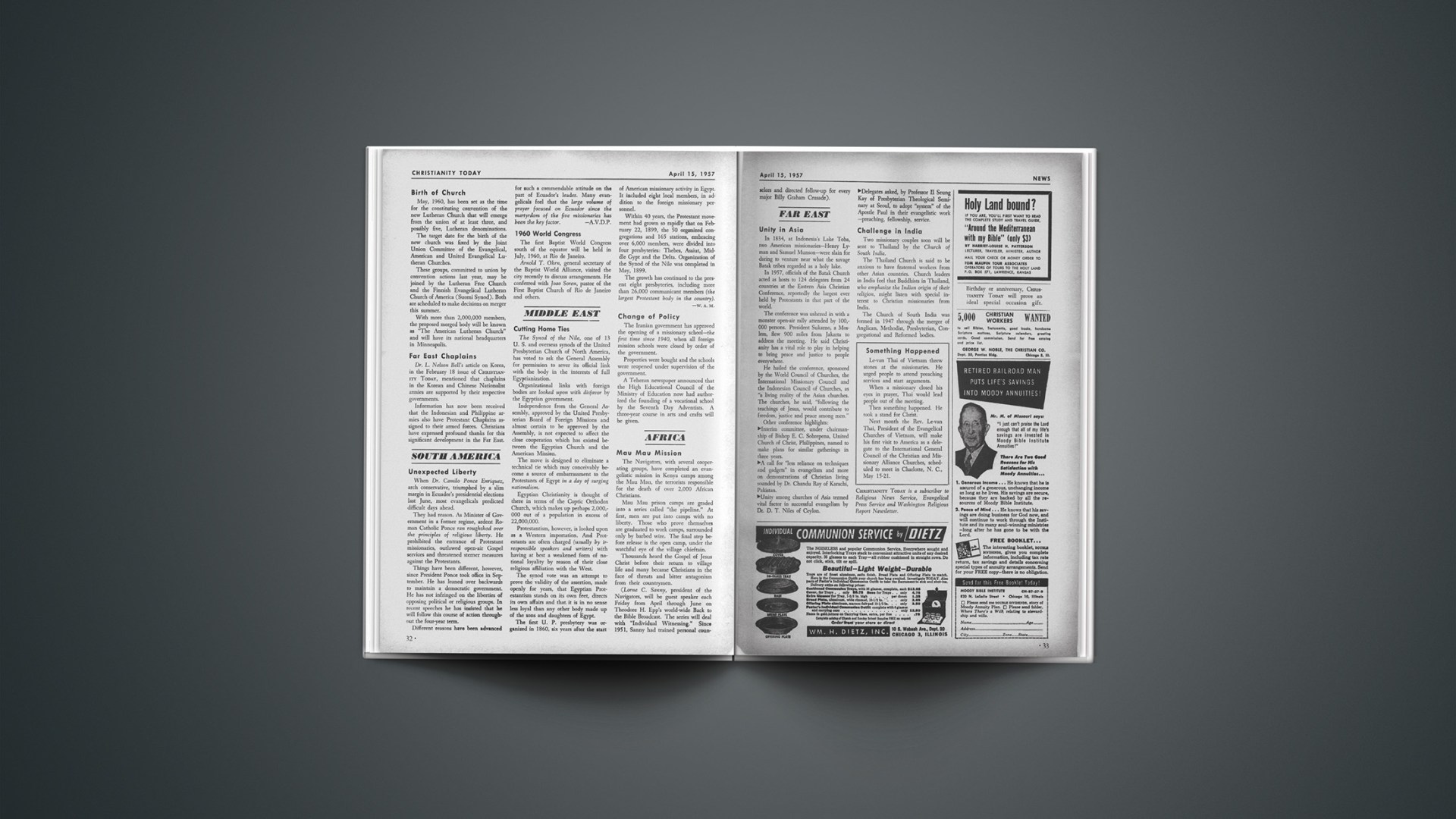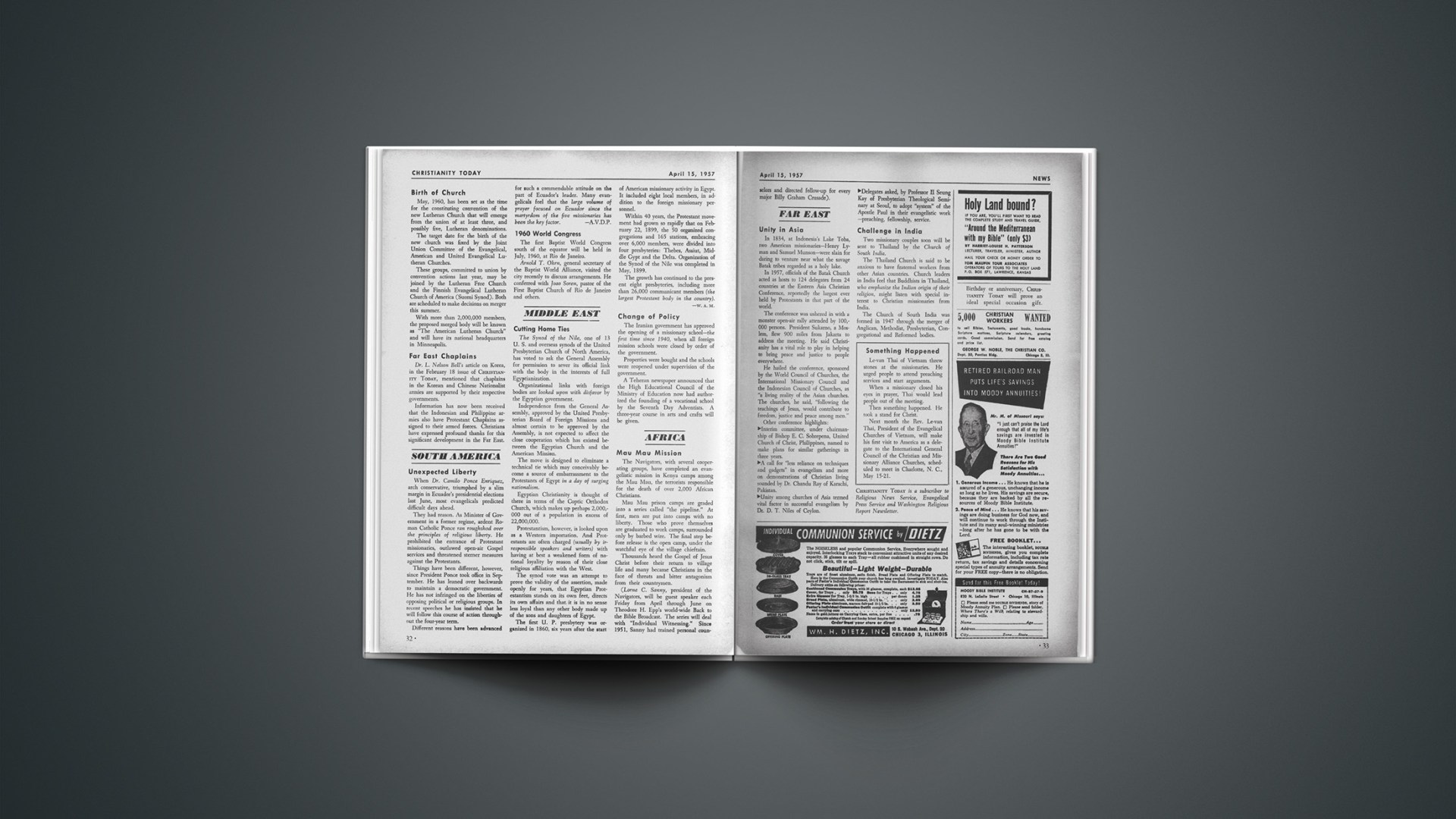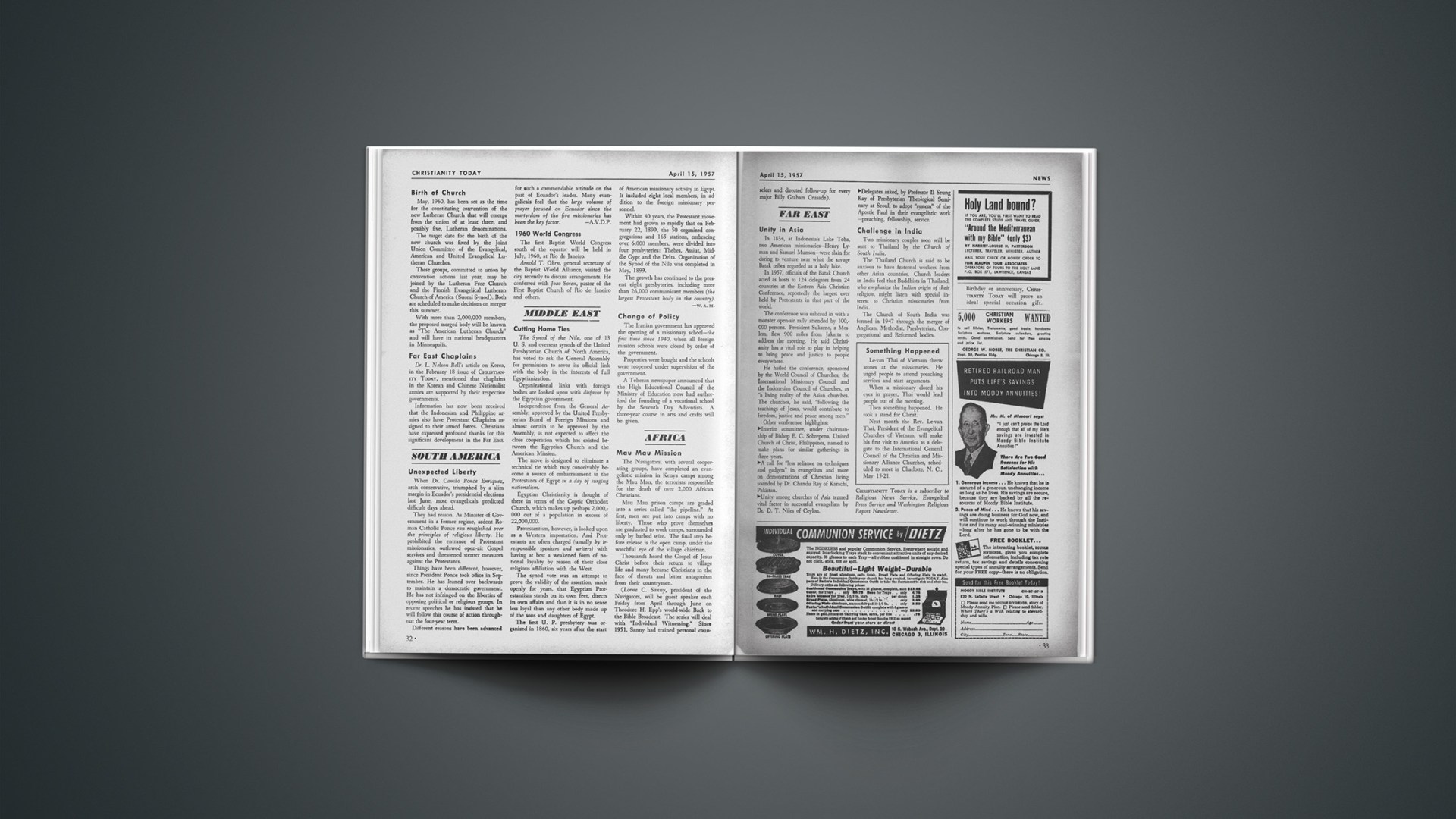And I have other sheep, that are not of this fold; I must bring them also, and they will heed my voice (John 10:16).
I had never taken much interest in speculation concerning space ships, space men, flying saucers and such. And yet the moment that the man appeared at my study door I knew that he was not of the earth. It was not that he differed greatly from earth men in physical characteristics. There was nothing grotesque or frightening about his appearance. He was a superb physical specimen. It was the radiance about his face which convinced me that here was a visitor from another planet. He possessed that quality which the medieval artists sought to portray when they painted halos on the saints.
His first words confirmed my deduction. “Excuse me, sir,” he said, “I am from outer space. My car is in the field west of the church.” His “car” proved to be a flying saucer surprisingly similar to the type portrayed in current fiction.
“I am a free-lance journalist,” he went on, “working on a feature. I want to visit some of the places on earth where people have not heard of Christ. Perhaps you will be so kind as to be my guide?”
“Do YOU know about Christ?” I asked.
“Oh, yes,” he replied. “There is but one God of the universe. He revealed himself to our planet just as he did to Earth by sending his only begotten Son as our Savior. Everything about his incarnation was just the same as it was at Bethlehem. The remainder of the story is the same also; the Savior died for our sins and arose again. The only difference is that our people have accepted what Christ has done. The first disciples were faithful in their witness, and others since then have been just as faithful. It was not long until all of the kingdoms of our planet became the kingdom of the Lord Jesus Christ, and he is today enthroned in every heart. Oh, yes; we know about Christ!”
He paused, and I reflected that this brief statement made many things plain. This was the secret of the radiance of his personality. All of his fellows would have that same glow. This too was the explanation of their advanced state of intellectual development, their superiority in the field of science as evidenced in their conquest of the space barrier. With everyone serving Christ their energies would not have been devastated in war or ravaged by poverty and disease.
My guest was speaking again. “Our people have difficulty in conceiving of life where Christ is not known. If you will accompany me as my guide to a few such places I will be obliged.”
In a few moments we were in his car, as he called it, and were hurtling through space. As we went my companion told me something of his way of life, and I realized that compared with ours his should be spelled with a capital “L.” He was enjoying what Jesus had envisioned when he said, “I am come that you might have life, and that you might have it more abundantly.” I saw that the glorious prophecies of Isaiah had been literally fulfilled upon his planet: “The glory of the Lord shall be revealed, and all flesh shall see it together”; “They shall not hurt nor destroy in all my holy mountain, saith the Lord”; “The whole earth shall be full of his glory.”
We touched down first in Japan. A missionary friend took us to a remote mountain community of 10,000 persons not one of whom is a professing Christian. A huge Shinto shrine dominates the town. The shrine is served by more than 200 priests who preside at the mechanical rituals which have little or no religious significance. While the people here were outwardly cheerful there was an air of depressing hopelessness which made us sad. I thought that the community was a good example of a place where Christ was unknown, but my friend from outer space did not agree. “It is true that these people do not know Christ, never having heard his name; but,” he said, “even this remote community in a heathen land is not untouched by Christian civilization. The hospital, although pitifully inadequate, would not be here had Christ not come to earth. The schools reflect an inspiration which Shintoism failed to produce in 2000 years. These are byproducts of western civilization, which is itself a byproduct of Christianity.”
So I guided him to the fastness of inner Mongolia to an area so remote that I could have believed myself on another planet. I explained to my friend that it was reported that not even the Communists had yet penetrated to this region. He looked at me strangely and made a remark which haunts me still. “Even the Communists, did you say? Am I to infer that the Communists excel the Christians in missionary zeal and enterprise?” Well, we would not find any westernizing influence here. The people were so primitive that I was fearful what our reception might be. To my relief we were received with grave courtesy and kindness. I was astounded to discover that a few of the people could converse with us. A long time ago a white man had come to them and lived among them. He had given them a book, and had taught a few of them his language that they might read the book. This they were still doing. They brought the book to us, an ancient copy of the Holy Bible! There was no temple, or shrine or church in that place; only a Bible. Distorted as their understanding of the book was it was a light in the darkness, and they were walking in it. All of the darkness of that vast continent had not put out that tiny light.
My friend from outer space was deeply impressed by what we had discovered, but still we had not found a place untouched by Christian influence.
I took him next to India. He felt that I was wasting his time in taking him there. “You have had missionaries at work in India for well over 100 years,” he said. “They labored unhampered under the benevolent encouragement of the British government. Surely you have made an impression upon the people of this land.” When I reported that after more than a century of missionary labors less than one percent of the people of India are nominally Christian he was incredulous.
We flew low over the great plains of that huge subcontinent and observed thousands of villages many of which I knew had never heard of Christ. I told my friend how India is a land of contrasts and of inconsistencies; that abject poverty and immense wealth exist side by side. The religion of India is largely Hindu. The Hindus believe that life is sacred. They believe that life is so sacred that nothing is to be killed. A holy man will permit a louse or a flea to drive him half crazy rather than take its life. They do not destroy vermin or harmful bacteria or tubercular cattle or rabid animals. Life is too sacred to destroy so they stand by in apparent indifference as millions of human beings die of famine or of plague.
My friend was deeply shocked. “And you have not given them Christ?” he said, accusingly.
“Oh, but we have tried!” I protested.
“Have you indeed?” he asked coldly. “Have you given yourselves to Christ in complete commitment and abandonment of self that the lost might be won to him, or have you only given a little of your gold?”
In the heart of Africa we saw other people who had never heard of Christ. The darkness in which these tribes dwell is appalling. These animists live in abject fear of evil spirits and are under the domination of cruel witch doctors who exploit their superstition. As we observed their bondage to fear we recalled how Jesus had said, “Ye shall know the truth, and the truth will make you free.” Yet here we were nineteen centuries later among people none of whom as yet had been given the truth of God as revealed in Jesus Christ.
Suddenly the man from outer space was seized with fury. He fairly seethed, and I was taken with surprise that such a man as he was capable of such wrath. He had discovered that the penetration of commercial interests was greater than the penetration of the Gospel. We found Standard Oil and Coca-Cola where there was no chapel and no good news of salvation.
“I can’t believe it!” he cried. “My people will never believe that Christians with the means to make Christ known, and the opportunity, would be less enterprising and less determined than are commercial interests in marketing their product. Is it nothing to you Christians in America that these live and die in darkness?”
At last we were headed back over the Atlantic. It had been a harrowing experience for me because of my friend’s accusing observations. They were painfully true.
He asked to see our greatest city. We found it frantic with preparations for Christmas. We mingled with the surging crowds of Christmas shoppers; shoving, elbowing people with faces hard or haggard. We heard muttered curses. My friend again became agitated as he had in central Africa. I guided him to the sanctuary of the Fifth Avenue Presbyterian Church where we were sheltered from the press.
“What has this to do with Christmas?” he demanded. “How did this madness ever become a part of your commemoration of the birth of the Savior?”
I was at a loss for an answer. I did not tell him that there in New York City, U.S.A., we were in the midst of the greatest concentration of lost souls to be found anywhere this side of Hell.
We were silent as we sped home, and he bid me an almost silent good-by. I am certain that he was glad to get away.
I am haunted by the sadness of his eyes—almost pity it was, as he looked at me and then looked at the church behind me, its cross topped spire beautiful against the evening sky.
I wondered what sort of a story he would write.
And then I found myself back at my desk, the words of my Sunday’s sermon text before me: “All authority has been given unto me in heaven and on earth. Go ye therefore and make disciples of all the nations, baptizing them in the name of the Father, and of the Son and of the Holy Spirit; teaching them to observe all that I have commanded you; and lo, I am with you always even unto the end of the world.”
James M. Guthrie, D.D., is pastor of Westminster United Presbyterian Church, Marion, Indiana.


